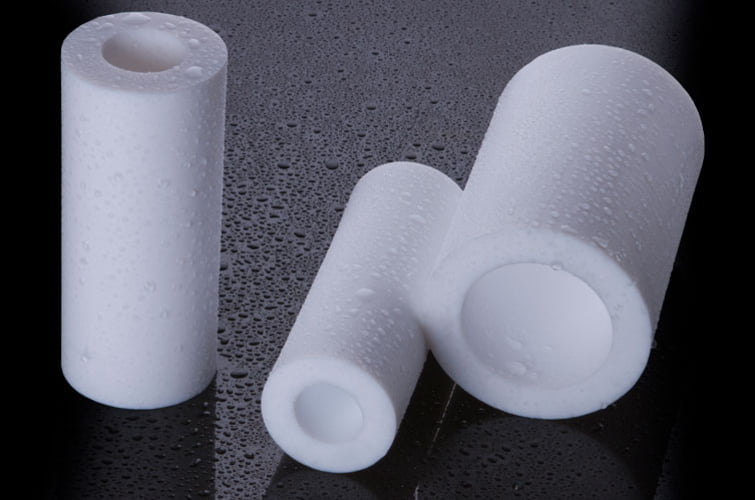
Color – white
PTFE 101 has a very high chemical resistance almost to any aggressive environment.
Seals made from PTFE 101 are not resistant only to molten alkali metals and elementary fluorine at high temperatures. It is important to remember when applying fluoroplastic seals at low temperatures (pressure), subsidence can occur.
PTFE 101 has an exceptionally wide temperature range (from -200°С up to +260°С), and the lowest friction coefficient among all plastic materials. PTFE 101 has a «non-stick» surface, doesn’t absorb moisture and has good electricity properties. It is also important to take into account the plastic flow versus time at insignificant load (cold flow).
Resistance
PTFE 101 is resistant almost to all chemicals, except elementary fluorine and molten alkali metals. PTFE has the lowest resistance to radiation among all plastic materials.
Application
The dynamic application in water is not recommended, in order to avoid wear increase.
Mainly used
- For hot or cold temperatures
- For sliding and back-up elements
- For rotating seals
- O-rings
- Structural part for chemical and electrical industries
Material Data Sheet
Properties | Value | Unit | Standard |
|---|---|---|---|
Hardness | ≥51 | Sh D | ASTM D2240 |
Density: | 2,14 – 2,18 | g/cm³ | ASTM D792 |
Tensile strength: | ≥30 | N/mm2 | ISO 12086 ISO 527 |
Elongation at break: | ≥300 | % | ISO 12086 ISO 527 |
Compressive strength at 1% deformation | 4 – 5 | N/mm2 | ASTM D695 |
Deformation under load at room temperature 24 hours at 13,7 N/mm2 | ≤17 | % | ASTM D621 |
Permanent deformation as above after 24 hours of rest atroom temperature | ≤9 | % | ASTM D621 |
Deformation under load at 260 °C after 24 hours at 41 N/mm2 | ≤32 | % | ASTM D621 |
Permanent deformation as above after 24 hours of rest at room temperature | ≤19 | % | ASTM D621 |
Impact strength Izod | 153 | J/m2 | ASTM D256 |
Coefficient of Linear Expansion ( 25° – 100°C ) | 12 – 13 | 0-5(mm/mm)/ °C | ASTM D696 |
Min. service temperature: | – 200 | °C | |
Max. service temperature (short term): | + 260 | °C |
All above established data results from random tests which were taken from the functioning production. All data was stated based on standard test-products in accordance with ISO, DIN and ASTM standards and can substantially not be extended to the completed seal. Our practical technical recommendation, either oral, written or through tests is given in conformity with our best knowledge. However, this data is to be regarded as non-obligatory advice, also taking into consideration any protective rights of a third party, and does not acquit you from making tests with our product in relation to its adaptability for the assigned process and intendment. Utilization, application and processing of the products befall completely outside of our control and are therefore solely your liability. As regards the responsibility, it will be limited to all damages in the value of the product which we delivered and you applied. Certainly, we do assure the immaculate quality of our products in concordance with our general sales and delivery conditions.
